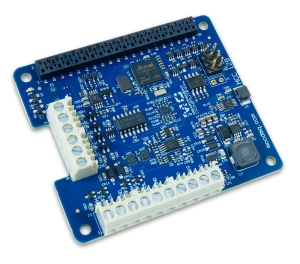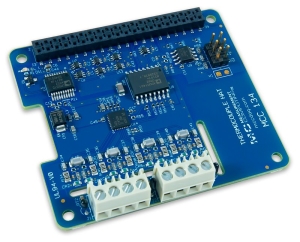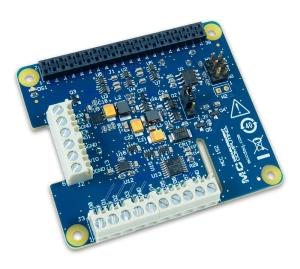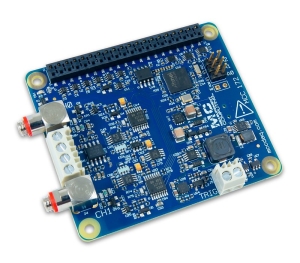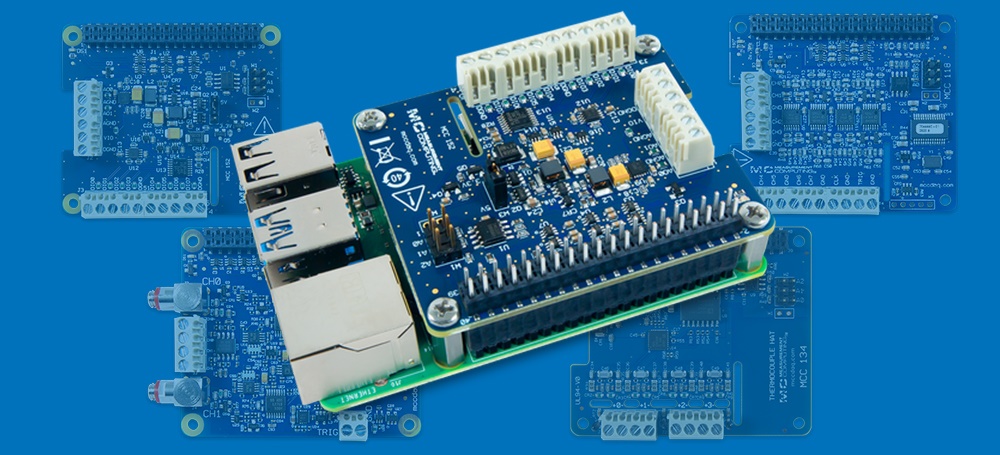
Precision Voltage, Thermocouple, and IEPE Measurements, plus Analog Output and Digital I/O
Designed for Test & Measurement applications that conform to the Raspberry Pi HAT (Hardware Attached on Top) standard, the MCC DAQ HATs provide data acquisition features in a small, stackable format. HAT configuration parameters are stored in an on-board EEPROM that allows the Raspberry Pi to automatically set up the GPIO pins when the HAT is connected. The open-source MCC DAQ HAT Library of commands in C/C++ and Python allows users to develop applications on the Raspberry Pi using Linux. The MCC DAQ HAT Library supports operation with multiple MCC DAQ HATs running concurrently. Console-based and user interface (UI) example programs are available for each API.
MCC 118/MCC 128 Voltage Measurement DAQ HAT for Raspberry Pi
12-bit/16-bit, high-speed 8-channel voltage measurement DAQ HATs
The Measurement Computing MCC 118/MCC 128 are voltage HAT boards designed for use with Raspberry Pi.
MCC 118: It provides eight single-ended (SE) analog inputs with a ±10V input range.
MCC 128: It provides eight single-ended (SE) or four differential (DIFF) analog inputs with the following input ranges: ±10 V, ±5 V, ±2 V, ±1 V.
A bidirectional clock I/O pin lets users pace operations with an external clock signal or with the board’s internal scan clock. Use software to set the direction. The external digital trigger input is software-configurable for rising or falling edge, or high or low level. MCC 118 and MCC 128 are powered with 3.3 V provided by the Raspberry Pi through the GPIO header connector.
MCC 134 Thermocouple Measurement DAQ HAT for Raspberry Pi
24-bit, 4-channel HAT for thermocouple measurements
The Measurement Computing MCC 134 is a thermocouple measurement HAT designed for use with Raspberry Pi. It features 24-bit resolution and provides professional-grade accuracy which is best in class. The MCC 134 provides four isolated thermocouple inputs. Users can connect up to four differential thermocouples (TC) to the MCC 134 input channels. TC types are software-selectable per channel (J, K, R, S, T, N, E, and B). TC values can be updated every 1 second, minimum. The MCC 134 is equipped with open thermocouple detection (OTD) for all TC input channels so users can monitor the board for broken or disconnected thermocouples. It also has three high-resolution cold-junction compensation (CJC) sensors.
MCC 152 Voltage Output and DIO DAQ HAT for Raspberry Pi
12-bit analog voltage output and digital input/output DAQ HAT
The Measurement Computing MCC 152 is a voltage output and digital input/output HAT designed for use with Raspberry Pi. The MCC 152 provides two 12-bit analog outputs with a 0 V to 5 V output range and 5 mA output drive, sourcing. Both outputs can be updated simultaneously with software. It provides eight bidirectional digital bits. Each digital bit is configurable for pull-up or pull-down or can be disabled. Each output bit can source 10 mA and sink 25 mA. Users can configure the software to generate an interrupt when the state of a digital input bit changes.
The MCC 152 can interface with 3.3 V or 5 V logic types. The input polarity is software programmable for normal (active high, default) or inverted logic (active low).
MCC 172 IEPE Measurement DAQ HAT for Raspberry Pi
24-bit DAQ HAT for making sound and vibration measurements
The Measurement Computing MCC 172 is a voltage HAT designed for use with Raspberry Pi. The MCC 172 features two channels for making sound and vibration measurements from IEPE sensors like accelerometers and microphones. The two 24-bit single-ended analog input channels simultaneously acquire data at rates up 51.2 kS/s. Users can turn IEPE excitation current on or off. Each channel has a dedicated A/D converter. Both ADCs share the same clock and are synchronized to start conversions at the same time for synchronous data. Multiple MCC 172 HATs can be synchronized to a single sampling clock. The clock is programmable for sampling rates between 51.2 kS/s to 200 S/s.
The trigger input (terminal TRIG) is used to delay an input scan until a specified condition is met at the trigger input.
Demo/project links
- Hardware Overview
- Installation Manual
- Installing and Using the Library
- C library reference
- Python library reference
- Open-source Library for C/C++ and Python
MCC DAQ HATs for Raspberry Pi are now available in Elfa Distrelec Denmark.

